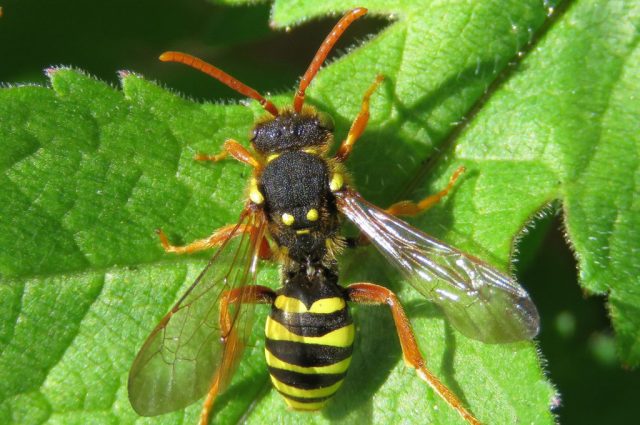What will the project do?
Life on the Edge is a partnership project funded by the National Lottery Heritage Fund, which will see Buglife working alongside South Devon National Landscape (project lead), National Trust, Torbay Coast and Countryside Trust and the South West Coast Path Association.
Life on the Edge aims to save species; giving them a safer long-term future by expanding and reconnecting the traditional coastal landscapes on which they depend. Restoring wildflower-rich cliff tops and highway verges, carefully managing scrub mosaics, strategic hedgerow connections, and more wildlife-friendly parks, churchyards, school grounds and private gardens.
Our project area covers the whole of the B-Line along the South Devon coast, within which we have identified five “Project Hotspots” (accounting for 3,960ha of the 12,260ha area that the South Devon coastal B-Line covers between them). These priority areas include Wembury, The Erme, Bolt Head to Bolt Tail, Prawle Point to Start Point, and Brownstone to Berry Head. Within our Hotspots we aim to create 100ha of new seed donor sites and restore or create 675ha of species rich grassland habitat to support our target invertebrates.
While our work will focus in these areas, we will engage, inspire and support landowners and land managers across the project area to restore habitats throughout the B-Line, aiming to support the creation of a 1,300 ha network of nature-friendly farmland that connects our Hotspots. In this way, we hope to secure landscape-scale change through the project.
![Brown-banded Carder Bee (Bombus Humilis) Queen © Steven Falk]() Brown-banded Carder Bee (Bombus Humilis) Queen © Steven Falk
Brown-banded Carder Bee (Bombus Humilis) Queen © Steven Falk The connected network of B-Lines will enable species to move freely through our countryside, expand their populations and recolonise areas from where they have been lost.
The result will be a coastline, and its connected hinterland, that is buzzing with wildlife, packed with wildflowers and a treat for the eye of residents and visitors alike.
We’re excited to be working with South Devon National Landscape and other project partners to support Devon’s communities, from landowners and farmers to parish councils and school children, providing opportunities for everyone to get involved and make a real difference for the extraordinary and highly vulnerable species that call Devon home.
![Prawle Point, South Devon © Hayley Herridge]() Prawle Point, South Devon © Hayley Herridge
Prawle Point, South Devon © Hayley Herridge
The 30 threatened invertebrate species Life on the Edge will support are: Hemlock Water-dropwort Bee (Andrena ampla), Hawksbeard Mining Bee (Andrena fulvago), Carrot Mining Bee (Andrena nitidiuscula), Black Mining Bee (Andrena pillipes), Hornet Robberfly (Asilus crabroniformis), Six-belted Clearwing (Bembecia ichneumoniformis), Brown-banded Carder Bee (Bombus humilis), Dotted Bee-fly (Bombylius discolor), Moon Spider (Callilepis nocturna), Zipperback Hoverfly (Chrysotoxum elegans), Goldilocks Aster Moth (Coleophora linosyridella), Ridge-saddled Spider Wasp (Cryptocheilus notatus), a cranefly (Diacranomyia goritiensis), Long-horned Bee (Eucera longicornis), a mason wasp (Euodynerus quadrifasciatus), Grayling (Hipparchia Semele), Orange-footed Furrow Bee (Lasioglossum xanthopus), Silvery Leafcutter Bee (Megachile leachella), Short-necked Oil Beetle (Meloe brevicollis), Mediterranean Oil Beetle (Meloe mediterraneus), Black Oil Beetle (Meloe proscarabaeus), Devon Red-legged Robberfly (Neomochtherus pallipes), Six-banded Nomad Bee (Nomada sexfasciata), Grey Bush Cricket (Platycleis albopunctata), Silver-studded Blue (Plebejus argus), Red-tailed Blood Bee (Sphecodes rubicundus), Banded Dark Bee (Stelis punctulatissima), Thrift Clearwing (Synansphecia muscaeformis), Great Green Bush Cricket (Tettigonia viridissima) and Glow Worm (Lampyris noctiluca).
![Short-necked Oil Beetle (Meloe brevicollis) © Suzanne Burgess]() Short-necked Oil Beetle (Meloe brevicollis) © Suzanne Burgess
Short-necked Oil Beetle (Meloe brevicollis) © Suzanne Burgess How can you get involved?
Communities can get involved through a series of opportunities. Join us for:
- Guided walking tours of our hotspots;
- volunteer workdays;
- training workshops on habitat management & creation;
- species and habitat surveys and monitoring;
- wildlife gardening;
- supporting pollinator friendly initiatives in your local area.
Information, advice and support is also available to landowners who would like to know more about the project, how they can be involved and how to improve their land for pollinators.
Add your project to our B-Lines map!
For more information on how to get involved in our “Life on the Edge” project please contact Conservation Officer, Sam Skevington, at [email protected].
![Gooden’s Nomad Bee (Nomada goodeniana) © Steven Falk]() Gooden’s Nomad Bee (Nomada goodeniana) © Steven Falk
Gooden’s Nomad Bee (Nomada goodeniana) © Steven Falk 
 Life on the Edge is an exciting new Buglife partnership project that aims to restore viable populations of some of the UK’s rarest invertebrates and plants living along the South Devon coast between Berry Head and Wembury, including the last known colony of the Six-banded Nomad Bee (Nomada sexfasciata).
Life on the Edge is an exciting new Buglife partnership project that aims to restore viable populations of some of the UK’s rarest invertebrates and plants living along the South Devon coast between Berry Head and Wembury, including the last known colony of the Six-banded Nomad Bee (Nomada sexfasciata).











